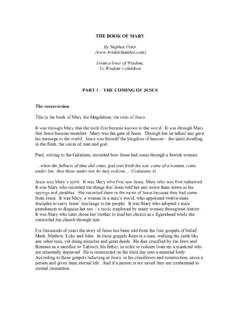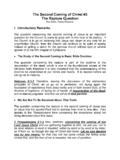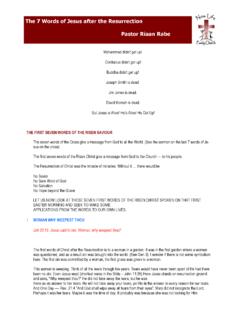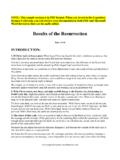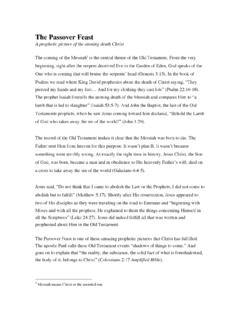Transcription of What Does it Mean to Seek the Kingdom of God - IC XC NIKA
1 What Does it Mean to seek the Kingdom of God?Matthew 6:33 and Luke 12:31 in the Contexts of the Sermon on the Mount and the Lucan ParablesDavid R. 13, 2001; text last modified (except typo correction) July 10, 2002 Footnotes 3-5 added August 29, 2005; footnotes 1-2 added November 21, 2007 Appendix added June 10, 2008 IntroductionWhat will I eat? How will I pay the bills? How will I have a happy marriage? How will I have a successful career? Everyone seems to be preoccupied with these kinds of concerns, but Jesus calmed his disciples by giving them a higher purpose. He told them not to worry about their needs in this world, but to instead seek God s Kingdom , having the promise that their heavenly Father would then also meet all those needs: ..do not be anxious, saying, What shall we eat? or What shall we drink? or What shall we wear? For the Gentiles seek all these things; and your heavenly Father knows that you need them all.
2 But seek first his Kingdom and his righteousness, and all these things shall be yours as well (Matt 6:31-33, RSV). The parallel account omits and his righteousness and adds an assurance: .. seek his Kingdom , and all these things shall be yours as well. Fear not, little flock, for it is your Father s good pleasure to give you the Kingdom (Luke 12:31-32). The first step in understanding what it means to seek the Kingdom of God is to determine what Jesus meant by his Kingdom . This is because Jesus used the word translated as Kingdom in a way that is very different from the typical usage of Kingdom in English as the land or people ruled by a Matthew, Mark, and Luke, the Kingdom of God is usually God s active rule over his creation, especially in saving his people from their sins and the consequences of those sins. (Matthew often uses Kingdom of heaven instead of Kingdom of God, but the two terms are synonymous (Matt 13:31a = Mark 4:30 = Luke 13:18), so Kingdom of heaven does not refer to heaven as a place, but to God s reign as King, reflecting the Jewish avoidance of direct reference to God.)
3 The Kingdom of God is not only God s rule over his obedient subjects, but includes his victory over their spiritual enemies through Jesus, beginning in the present age (Matt 12:28; Luke 1:68-75; 11:20). The Kingdom of God has been concisely defined as God s acting in his sovereign power to deliver man from the destructive powers that enthrall him (Beasley-Murray, 1989). The central thesis of Ladd (1974) is that the prophets hope of the Kingdom of God was inaugurated in the person of Jesus in this present age, before its consummation begins the age to come. God asserted His rule in history by defeating Satan and death through the work of Jesus, even though God will not complete his display of authority until Jesus returns in judgment, when he will start the new world , Ladd (1974, ch. 8, pp. 205-217) pointed out that the Kingdom of God does not always literally mean the dynamic reign of God, but that it sometimes refers to the gift of life and salvation achieved by that reign.
4 Jesus disciples are to seek the Kingdom as the most valuable of possessions and the Father gives the Kingdom to them (Matt 6:33; 13:44-46; Luke 12:31-32). Those who receive the Kingdom in the present age will enter the Kingdom in the age to come (Mark 10:15; Luke 18:16-17). Those who are poor in spirit, who are persecuted for righteousness sake, have the Kingdom (Matt 5:3, 10). When the Son of Man comes (Matt 25:31), the righteous will inherit the Kingdom (v. 34); Kingdom here is the same as eternal life (v. 46). Inheriting eternal life, inheriting the Kingdom , and receiving eternal life are equivalent (Mark 10:17, 23-24, 30) and are associated with being saved (v. 26). This salvation involves saving one s true life, as opposed to saving one s life in this age (Matt 10:39; Mark 8:35; Luke 17:33), and culminates in bodily resurrection (Luke 20:34-36) and restored communion with God in the age to come (Matt 5:8; 25:21, 23; Mark 14:25; Luke 14:16-24).
5 Although the Kingdom concept is primarily oriented to the future, Jesus also brought salvation and fellowship with God to the present age (Luke 19:10-11; Mark 2:15-19), though to a lesser, incomplete degree. Such salvation included other gifts enjoyed in this life, such as physical healing (Mark 5:34; 10:52), temporary resurrection (Matt 11:4-5), deliverance from demonic possession (Luke 8:36), forgiveness of sins (Mark 1:4; 2:10; Luke 7:48), and righteousness (Matt 6:33). That the Kingdom of God to be sought (Matt 6:33; Luke 12:31) is this gift of salvation brought by the rule of God, rather than the rule of God itself, will also be seen below. To seek the Kingdom of God is to actively receive the eternal life that Jesus brought. Seeking salvation does not end at the time of conversion, but continues throughout the life of each disciple of Jesus. What this entails will become clear from looking at the Kingdom -seeking passages in the context of Luke and its 4sequel (Acts) and in the context of Matthew.
6 Matthew s version is treated second since it is complicated by the exhortation to seek God s righteousness as well as his Kingdom . Luke-Acts on seeking the kingdomThrough parables and illustrations from nature, Jesus contrasted seeking the future salvation of the Kingdom with seeking the pleasures of this age (Luke 12:13-46). In the parable of the rich fool (vv. 13-21), Jesus rebuked a man for being overly concerned about receiving his share of the inheritance, as if one s wealth is the measure of success in life. The rich man of the parable depended on the wealth he had accumulated to take care of him in the future, but found that all his work was in vain since he had not provided for his future after his death. Expanding on the lesson of the parable ( therefore, v. 22), Jesus later gave the discourse on anxiety to his disciples (vv. 22-31). He told them not to worry about the needs of this life because, since God cares for the birds and the lilies, which do not toil, he will much more readily provide for his children.
7 Rather than worrying about earthly needs, like the nations do, Jesus disciples must seek the Kingdom of God, with the promise that God will meet all those needs. These injunctions are not two independent arguments against worrying, the first based on God s fatherly care for his creation and the second based on seeking the Kingdom , but are part of the same argument since God is both Father and King of his people (Beasley-Murray, 1989). It is not that God only gives his people food and clothing only to the extent that they seek his Kingdom : God richly provides for even those with little faith (v. 28) because he values them far above the birds and flowers. The Father will always meet the needs of those who seek the Kingdom ,1 however imperfectly, since they are the ones who are truly his 1 This interpretation overlooks the Father's provision for the unjust (Matthew 5:45; Luke 6:35-36; Acts 14:17). A more solid exposition distinguishes how to overcome anxiety believe the Father will feed and clothe you (Luke 12:22-24, 27-30) from why to overcome anxiety it serves no purpose (vv.)
8 25-26) and 5children. That seeking the Kingdom is not an isolated action, but a way of life for Jesus disciples, is also seen in the description of Joseph as a good, righteous man who looks for the Kingdom (23:50-51). On the other hand, those who are not children of God do not even have little faith, which is accepted by God (17:5-6), but no faith, consistently seeking the things of this life (12:30), so Jesus told the disciples not to act like them, but like the children of God. Since the Kingdom is something that one can seek instead of earthy things, it is something that can be possessed; in fact, the Kingdom is a possession given by the Father (12:32). Thus, Kingdom here is the salvation brought by Jesus, as noted in the Introduction. In addition to the blessings of salvation, God promised to give His children what they need in this age (Luke 12:31). Ladd (1974, p. 137) inferred from the fact that all these things are added to the Kingdom that the Kingdom can be experienced in the present age.
9 It is true that salvation is experienced to some extent upon conversion; this includes the present gifts of forgiveness and the Holy Spirit (Luke 3:16; 11:9-13; Acts 1:5; 2:38-41; 8:20), who brings boldness in proclamation, wisdom, comfort, faith, and joy (Acts 4:31; 6:3-5; 9:31; 11:24; 13:52). However, in the next saying (Luke 12:32-34), Jesus made it clear that the Kingdom will be primarily enjoyed in the future: the blessings of the Kingdom are described as eternal treasures in the heavens. Although, like the Kingdom (Luke 18:17), these heavenly treasures are said to be possessed now, the contrast with the temporary treasures of the earth reinforces the message of the parable that led to the discussion on worry: the future state is far more important than the present state (vv. 13-21). The theme of seeking future, eternal treasure rather than present, temporary treasure is continued in the parables that follow immediately (12:35-46).
10 In two of these parables, servants must be ready for the coming of their master, and in the third, a householder must be ready for the distracts you from seeking the treasure of the Kingdom (vv. 31-34). The unconditional promise that your compassionate Father will satisfy your needs frees you to seek with abandon what is truly valuable (vv. 30-31; 10:38-42).6coming of a thief. In each case, the unexpected coming represents the coming of the Son of Man in judgment at an unknown time in the future. In this context, being ready means seeking the Kingdom of God rather than earthly treasure (vv. 30-34). Thus, when the Son of Man comes, those who are found seeking the Kingdom will be rewarded (vv. 38, 42-43), but those who are found seeking immediate pleasure will be punished and put with the unfaithful (vv. 45-46). The message of these parables, to be ready for future judgment, is the same as that of the parable of the rich fool, where the unexpected judgment occurs at death rather than at the coming of the Son of also warned his disciples to be ready for his coming in his eschatological discourse (Luke 21:5-36).
